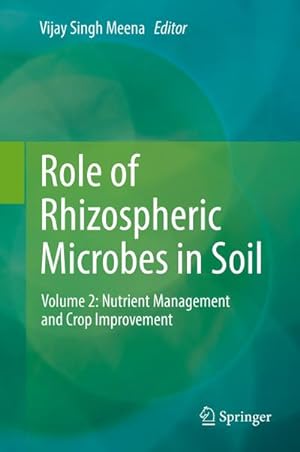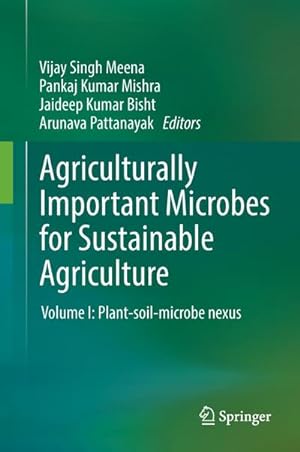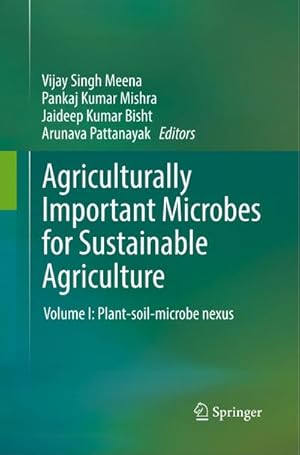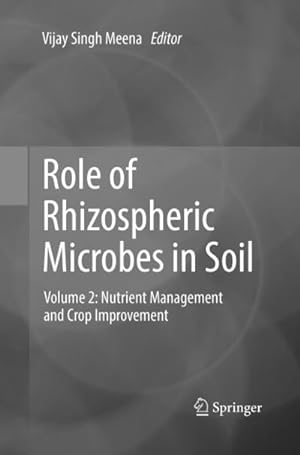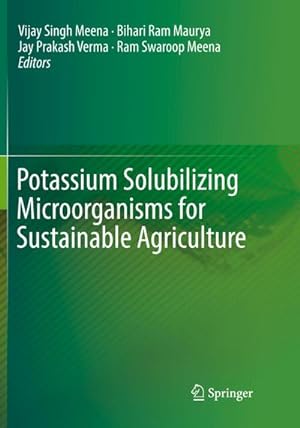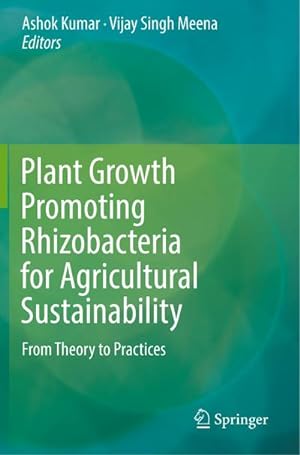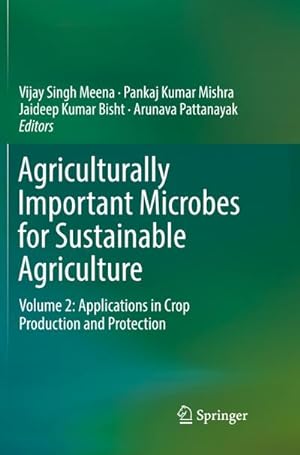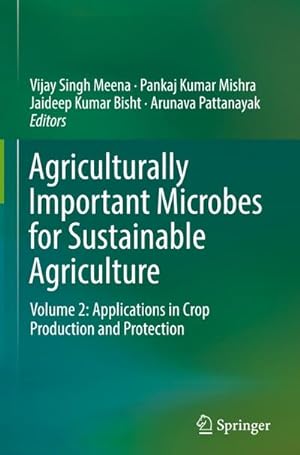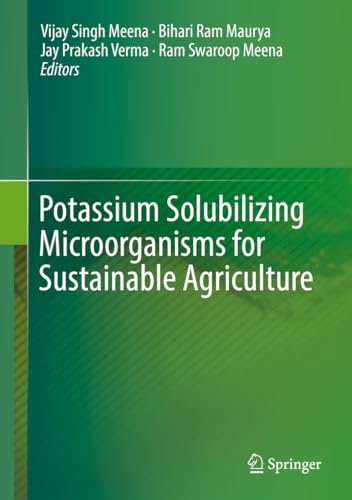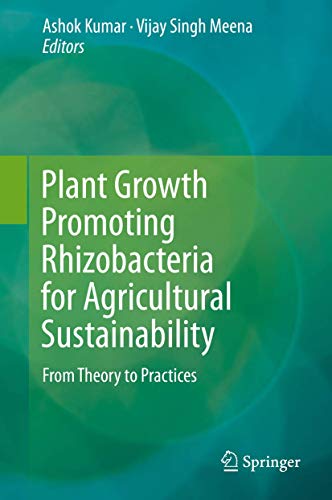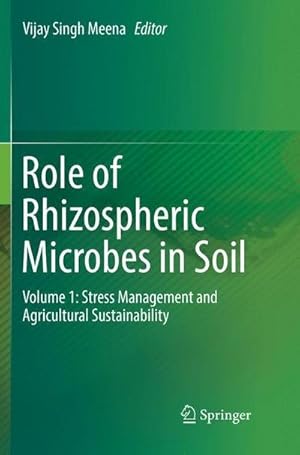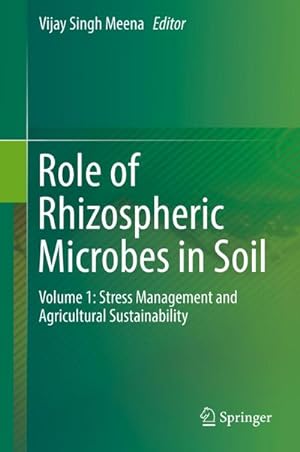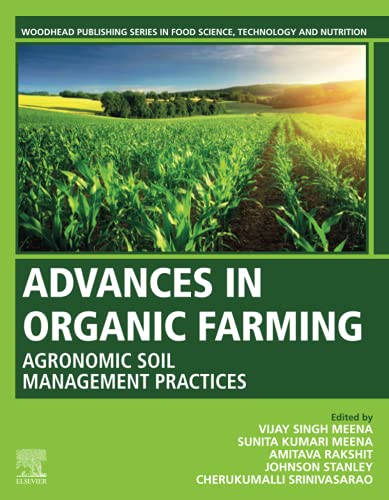vijay singh meena (15 Ergebnisse)
Produktart
- Alle Produktarten
- Bücher (15)
- Magazine & Zeitschriften
- Comics
- Noten
- Kunst, Grafik & Poster
- Fotografien
- Karten
-
Manuskripte &
Papierantiquitäten
Zustand
Einband
Weitere Eigenschaften
- Erstausgabe
- Signiert
- Schutzumschlag
- Angebotsfoto (12)
Land des Verkäufers
Verkäuferbewertung
-
Role of Rhizospheric Microbes in Soil : Volume 2: Nutrient Management and Crop Improvement
Verlag: Springer Nature Singapore, 2018
ISBN 10: 9811300437ISBN 13: 9789811300431
Anbieter: AHA-BUCH GmbH, Einbeck, Deutschland
Buch
Buch. Zustand: Neu. Druck auf Anfrage Neuware - Printed after ordering - In any ecosystem, plant and microbe interaction is inevitable. They not only co-exist but also support each other's survival and also provide for sustenance in stressful environment. Agro-ecosystems of many regions around the globe are affected by multi-stress. Major limiting factors affecting the agricultural productivity worldwide are environmental stresses. Apart from decreasing yield they introduce devastating impact on plant growth as well. Plants battle with various kind of stresses with the help of symbiotic association with the microbes in the rhizosphere. Naturally existing plant-microbe interaction facilitates survival of plants under these stressful conditions. Rhizosphere consists of many groups of microbes, plant growth-promoting bacteria (PGPB) is one such group of microbes which assist plants in coping with multiple stresses and in plant growth as well. These microbes help in stress physiology of the plants and can be extremely useful in solvingagricultural as well food security problems.The proposed book is split into two parts, with an aim to provide comprehensive description and highlight a holistic approach. It elucidates various mechanisms in rhizosphere of nutrient management, stress tolerance and enhanced crop productivity. The book discusses rhizospheric flora and its importance in enhancement of plant growth, nutrient content, yield of various crops and vegetables as well as soil fertility and health. Both volumes of the book addresses fundamentals, applications as well as research trends and new prospects of agricultural sustainability. Volume 2: Nutrient Management and Crop Improvement, contains chapters which cover a broad overview of plant growth promoting activities of microbes. This proposed book also highlights the contribution of nitrogen, phosphorus, potassium, iron and zinc-solubilizing microbes from rhizospheric soil to develop efficient indigenous microbial consortia to enhance the food and nutritional security. With the given content and layout the proposed book will be an all-inclusive collection of information, which will be useful for students, academicians, researchers working in the field of rhizospheric mechanisms, agricultural microbiology, soil microbiology, biotechnology, agronomy and sustainable agriculture and also for policy makers in the area of food security and sustainable agriculture. It will be of special interest to both academics and professionals working in the fields of microbiology, soil microbiology, biotechnology and agronomy, as well as the plant protection sciences. Timely, this edited and research book provides an essential and comprehensive source of material from basic to advance findings on microbes and their role in agricultural and soil sustainability.
-
Agriculturally Important Microbes for Sustainable Agriculture : Volume I: Plant-soil-microbe nexus
Verlag: Springer Nature Singapore, 2017
ISBN 10: 9811055882ISBN 13: 9789811055881
Anbieter: AHA-BUCH GmbH, Einbeck, Deutschland
Buch
Buch. Zustand: Neu. Druck auf Anfrage Neuware - Printed after ordering - This book presents a compilation of case studies from different countries on achieving agricultural sustainability. The book stresses that, in order to meet the needs of our rapidly growing population, it is imperative to increase agricultural productivity. If global food production is to keep pace with an increasingpopulation, while formulating new food production strategies for developing countries, the great challenge for modern societies is to boost agricultural productivity. Today, the application of chemicals to enhance plant growth or induced resistance in plants is limited due to the negative effects of chemical treatment and the difficulty of determining the optimal concentrations to benefit the plant. In the search for alternative means to solve these problems, biological applications have been extensively studied. Naturally occurring plant-microbe-environment interactions are utilized in many ways to enhance plant productivity. As such, a greater understanding of how plants and microbes coexist and benefit one another can yield new strategies to improve plant productivity in the most sustainable way. Developing sustainable agricultural practices requires understanding both the basic and applied aspects of agriculturally important microorganisms, with a focus on transforming agricultural systems from being nutrient-deficient to nutrient-rich. This work is divided into two volumes, the aim being to provide a comprehensive description and to highlight a holistic approach, respectively. Taken together, the two volumes address the fundamentals, applications, research trends and new prospects of agricultural sustainability. Volume one consists of two sections, with the first addressing the role of microbes in sustainability, and the second exploring beneficial soil microbe interaction in several economically important crops. Section I elucidates various mechanisms and beneficial natural processes that enhance soil fertility and create rhizospheric conditions favourable for high fertility and sustainable soil flora. It examines the mechanism of action and importance of rhizobacteria and mycorrhizal associations in soil. In turn, section II presents selected case studies involving economically important crops. This section explains how agriculturally beneficial microbes have been utilized in sustainable cultivation with high productivity. Sustainable food production without degrading the soil and environmental quality is a major priority throughout the world, making this book a timely addition. It offers a comprehensive collection of information that will benefit students and researchers working in the field of rhizospheric mechanisms, agricultural microbiology, biotechnology, agronomy and sustainable agriculture, as well as policymakers in the area of food security and sustainable agriculture.
-
Agriculturally Important Microbes for Sustainable Agriculture : Volume I: Plant-soil-microbe nexus
Verlag: Springer Nature Singapore, 2018
ISBN 10: 9811354367ISBN 13: 9789811354366
Anbieter: AHA-BUCH GmbH, Einbeck, Deutschland
Buch
Taschenbuch. Zustand: Neu. Druck auf Anfrage Neuware - Printed after ordering - This book presents a compilation of case studies from different countries on achieving agricultural sustainability. The book stresses that, in order to meet the needs of our rapidly growing population, it is imperative to increase agricultural productivity. If global food production is to keep pace with an increasingpopulation, while formulating new food production strategies for developing countries, the great challenge for modern societies is to boost agricultural productivity. Today, the application of chemicals to enhance plant growth or induced resistance in plants is limited due to the negative effects of chemical treatment and the difficulty of determining the optimal concentrations to benefit the plant. In the search for alternative means to solve these problems, biological applications have been extensively studied. Naturally occurring plant-microbe-environment interactions are utilized in many ways to enhance plant productivity. As such, a greater understanding of how plants and microbes coexist and benefit one another can yield new strategies to improve plant productivity in the most sustainable way. Developing sustainable agricultural practices requires understanding both the basic and applied aspects of agriculturally important microorganisms, with a focus on transforming agricultural systems from being nutrient-deficient to nutrient-rich. This work is divided into two volumes, the aim being to provide a comprehensive description and to highlight a holistic approach, respectively. Taken together, the two volumes address the fundamentals, applications, research trends and new prospects of agricultural sustainability. Volume one consists of two sections, with the first addressing the role of microbes in sustainability, and the second exploring beneficial soil microbe interaction in several economically important crops. Section I elucidates various mechanisms and beneficial natural processes that enhance soil fertility and create rhizospheric conditions favourable for high fertility and sustainable soil flora. It examines the mechanism of action and importance of rhizobacteria and mycorrhizal associations in soil. In turn, section II presents selected case studies involving economically important crops. This section explains how agriculturally beneficial microbes have been utilized in sustainable cultivation with high productivity. Sustainable food production without degrading the soil and environmental quality is a major priority throughout the world, making this book a timely addition. It offers a comprehensive collection of information that will benefit students and researchers working in the field of rhizospheric mechanisms, agricultural microbiology, biotechnology, agronomy and sustainable agriculture, as well as policymakers in the area of food security and sustainable agriculture.
-
Role of Rhizospheric Microbes in Soil : Volume 2: Nutrient Management and Crop Improvement
Verlag: Springer Nature Singapore, 2019
ISBN 10: 9811343179ISBN 13: 9789811343179
Anbieter: AHA-BUCH GmbH, Einbeck, Deutschland
Buch
Taschenbuch. Zustand: Neu. Druck auf Anfrage Neuware - Printed after ordering - In any ecosystem, plant and microbe interaction is inevitable. They not only co-exist but also support each other's survival and also provide for sustenance in stressful environment. Agro-ecosystems of many regions around the globe are affected by multi-stress. Major limiting factors affecting the agricultural productivity worldwide are environmental stresses. Apart from decreasing yield they introduce devastating impact on plant growth as well. Plants battle with various kind of stresses with the help of symbiotic association with the microbes in the rhizosphere. Naturally existing plant-microbe interaction facilitates survival of plants under these stressful conditions. Rhizosphere consists of many groups of microbes, plant growth-promoting bacteria (PGPB) is one such group of microbes which assist plants in coping with multiple stresses and in plant growth as well. These microbes help in stress physiology of the plants and can be extremely useful in solvingagricultural as well food security problems.The proposed book is split into two parts, with an aim to provide comprehensive description and highlight a holistic approach. It elucidates various mechanisms in rhizosphere of nutrient management, stress tolerance and enhanced crop productivity. The book discusses rhizospheric flora and its importance in enhancement of plant growth, nutrient content, yield of various crops and vegetables as well as soil fertility and health. Both volumes of the book addresses fundamentals, applications as well as research trends and new prospects of agricultural sustainability. Volume 2: Nutrient Management and Crop Improvement, contains chapters which cover a broad overview of plant growth promoting activities of microbes. This proposed book also highlights the contribution of nitrogen, phosphorus, potassium, iron and zinc-solubilizing microbes from rhizospheric soil to develop efficient indigenous microbial consortia to enhance the food and nutritional security. With the given content and layout the proposed book will be an all-inclusive collection of information, which will be useful for students, academicians, researchers working in the field of rhizospheric mechanisms, agricultural microbiology, soil microbiology, biotechnology, agronomy and sustainable agriculture and also for policy makers in the area of food security and sustainable agriculture. It will be of special interest to both academics and professionals working in the fields of microbiology, soil microbiology, biotechnology and agronomy, as well as the plant protection sciences. Timely, this edited and research book provides an essential and comprehensive source of material from basic to advance findings on microbes and their role in agricultural and soil sustainability.
-
Potassium Solubilizing Microorganisms for Sustainable Agriculture
Verlag: Springer India, 2018
ISBN 10: 8132238338ISBN 13: 9788132238331
Anbieter: AHA-BUCH GmbH, Einbeck, Deutschland
Buch
Taschenbuch. Zustand: Neu. Druck auf Anfrage Neuware - Printed after ordering - The potassium solubilizing microorganisms (KSMs) are a rhizospheric microorganism which solubilizes the insoluble potassium (K) to soluble forms of K for plant growth and yield. K-solubilization is carried out by a large number of saprophytic bacteria (Bacillus mucilaginosus, B. edaphicus, B. circulans, Acidothiobacillus ferrooxidans, Paenibacillus spp.) and fungal strains (Aspergillus spp. and Aspergillus terreus). Major amounts of K containing minerals (muscovite, orthoclase, biotite, feldspar, illite, mica) are present in the soil as a fixed form which is not directly taken up by the plant.Nowadays most of the farmers use injudicious application of chemical fertilizers for achieving maximum productivity. However, the KSMs are most important microorganisms for solubilizing fixed form of K in soil system. The KSMs are an indigenous rhizospheric microorganism which show effective interaction between soil-plant systems. The main mechanism of KSMs is acidolysis, chelation, exchange reactions, complexolysis and production of organic acid. According to the literature, currently negligible use of potassium fertilizer as chemical form has been recorded in agriculture for enhancing crop yield. Most of the farmers use only nitrogen and phosphorus and not the K fertilizer due to unawareness that the problem of K deficiency occurs in rhizospheric soils. The K fertilizer is also costly as compared to other chemical fertilizers.
-
Plant Growth Promoting Rhizobacteria for Agricultural Sustainability : From Theory to Practices
Verlag: Springer Nature Singapore, 2020
ISBN 10: 9811375550ISBN 13: 9789811375552
Anbieter: AHA-BUCH GmbH, Einbeck, Deutschland
Buch
Taschenbuch. Zustand: Neu. Druck auf Anfrage Neuware - Printed after ordering - To meet the food security needs of the 21st century, this book focuses on ecofriendly and sustainable production technologies based on plant growth promoting rhizobacteria (PGPR). It is estimated that the global population could increase to 9 billion by 2050. Further, the amount of land devoted to farming has decreased. Soil is a living entity, and is not only a valuable natural resource for agricultural and food security, but also for the preservation of all life processes. Agricultural productivity rests on the foundation of microbial diversity in the soil, and in recent years, PGPR have emerged as an important and promising tool for sustainable agriculture.The injudicious use of agrochemicals by farmers has created a range of negative impacts, not only threatening the environment, but also destroying useful microorganisms in the soil. The efficient use of PGPR reduces the need for these chemicals while simultaneously lowering production costs. In turn, increased yields could provide a more favourable environment and encourage sustainability. This book assesses the impacts of PGPR on crops, environmental and socio-economic sustainability, and demonstrates these ecofriendly technologies' three critical advantages, namely (a) enhanced crop productivity, (b) reduced application of agrochemicals, and (c) increased incomes for farmers. Besides offering an economically attractive and ecologically sound means of augmenting the nutrient supply and combatting soil-borne pathogens, PGPR play an important part in boosting soil fertility, bioremediation and stress management for the development of ecofriendly and sustainable agriculture.
-
Agriculturally Important Microbes for Sustainable Agriculture : Volume 2: Applications in Crop Production and Protection
Verlag: Springer Nature Singapore, 2018
ISBN 10: 9811353719ISBN 13: 9789811353710
Anbieter: AHA-BUCH GmbH, Einbeck, Deutschland
Buch
Taschenbuch. Zustand: Neu. Druck auf Anfrage Neuware - Printed after ordering - This book is a compilation of case studies from different countries and covers contemporary with future prospective for sustainable development of agriculture. The book highlights the real-world as well as future generation situations facing the challenges for the twenty first century will be production of sufficient food and highlights the strengths, weaknesses and opportunities, to meet the needs of fast growing population it is imperative to increase agricultural productivity in an environmentally sustainable manner. Due to imbalanced use of chemical fertilizers and agrochemicals has a considerable negative impact on economy and environmental sustainability of nation, for the sustainable alternative means to solve these problems, the efficient utilization of biological agents have been extensively studied. Naturally existing plant-microbe-environment interactions are utilized in many ways for enhancing plant productivity. A greater understanding of how plants and microbes live together and benefit each other can therefore provide new strategies to improve plant productivity, in most sustainable way. To achieve the objective of sustainable agricultural practices there is a need for understanding both basic and applied aspects of agriculturally important microorganisms. Focus needs to be on transforming agricultural systems from nutrient deficient to nutrient rich soil-plant system. This book is split into two parts, with an aim to provide comprehensive description and highlight a holistic approach. It elucidated various mechanisms of nutrients solubilisation and its importance in enhancement of plant growth, nutrient content, yield of various crops and vegetables as well as soil fertility and health. Unit-1 in this book explains the importance of soil microbes in sustainable crop production. It contains chapters detailing the role and mechanism of action of soil microbes which enhances the productivity via various bio-chemical and molecularchannels. In unit-2 the role of microbes in plant protection is elaborated. With the help of case studies of food crops, multiple ways in which soil microbes help in fighting and preventing plant diseases is explained. With the given content and layout book will be an all-inclusive collection of information, which will be useful for students, academicians, researchers working in the field of rhizospheric mechanisms, agricultural microbiology, soil microbiology, biotechnology, agronomy and sustainable agriculture and also for policy makers in the area of food security and sustainable agriculture.
-
Agriculturally Important Microbes for Sustainable Agriculture : Volume 2: Applications in Crop Production and Protection
Verlag: Springer Nature Singapore, 2017
ISBN 10: 9811053421ISBN 13: 9789811053429
Anbieter: AHA-BUCH GmbH, Einbeck, Deutschland
Buch
Buch. Zustand: Neu. Druck auf Anfrage Neuware - Printed after ordering - This book is a compilation of case studies from different countries and covers contemporary with future prospective for sustainable development of agriculture. The book highlights the real-world as well as future generation situations facing the challenges for the twenty first century will be production of sufficient food and highlights the strengths, weaknesses and opportunities, to meet the needs of fast growing population it is imperative to increase agricultural productivity in an environmentally sustainable manner. Due to imbalanced use of chemical fertilizers and agrochemicals has a considerable negative impact on economy and environmental sustainability of nation, for the sustainable alternative means to solve these problems, the efficient utilization of biological agents have been extensively studied. Naturally existing plant-microbe-environment interactions are utilized in many ways for enhancing plant productivity. A greater understanding of how plants and microbes live together and benefit each other can therefore provide new strategies to improve plant productivity, in most sustainable way. To achieve the objective of sustainable agricultural practices there is a need for understanding both basic and applied aspects of agriculturally important microorganisms. Focus needs to be on transforming agricultural systems from nutrient deficient to nutrient rich soil-plant system. This book is split into two parts, with an aim to provide comprehensive description and highlight a holistic approach. It elucidated various mechanisms of nutrients solubilisation and its importance in enhancement of plant growth, nutrient content, yield of various crops and vegetables as well as soil fertility and health. Unit-1 in this book explains the importance of soil microbes in sustainable crop production. It contains chapters detailing the role and mechanism of action of soil microbes which enhances the productivity via various bio-chemical and molecularchannels. In unit-2 the role of microbes in plant protection is elaborated. With the help of case studies of food crops, multiple ways in which soil microbes help in fighting and preventing plant diseases is explained. With the given content and layout book will be an all-inclusive collection of information, which will be useful for students, academicians, researchers working in the field of rhizospheric mechanisms, agricultural microbiology, soil microbiology, biotechnology, agronomy and sustainable agriculture and also for policy makers in the area of food security and sustainable agriculture.
-
Potassium Solubilizing Microorganisms for Sustainable Agriculture
Verlag: Springer, 2016
ISBN 10: 8132227743ISBN 13: 9788132227748
Anbieter: Norbert Kretschmann, Bad Aibling, Deutschland
Buch
Gebundene Ausgabe. Zustand: Wie neu. 349 Seiten; Buchdeckel leicht berieben/bestossen. Innenteil tadellos - u n g e l e s e n - keine Risse, Knicke, Anmerkungen. ! Altersbedingt minimal nachgedunkelt! KEIN Mängelexemplar! Versand aus München V1266 Sprache: Deutsch Gewicht in Gramm: 8842.
Mehr Angebote von anderen Verkäufern bei ZVAB
Neu ab EUR 164,03
Gebraucht ab EUR 79,00
Mehr entdecken Hardcover
-
Plant Growth Promoting Rhizobacteria for Agricultural Sustainability. From Theory to Practices.
Verlag: Singapore, Springer., 2019
ISBN 10: 9811375526ISBN 13: 9789811375521
Buch
XI, 314 p. Hardcover. Versand aus Deutschland / We dispatch from Germany via Air Mail. Einband bestoßen, daher Mängelexemplar gestempelt, sonst sehr guter Zustand. Imperfect copy due to slightly bumped cover, apart from this in very good condition. Stamped. Sprache: Englisch.
Mehr Angebote von anderen Verkäufern bei ZVAB
Neu ab EUR 164,03
Gebraucht ab EUR 23,00
Mehr entdecken Hardcover
-
Role of Rhizospheric Microbes in Soil : Volume 1: Stress Management and Agricultural Sustainability
Verlag: Springer Nature Singapore, 2019
ISBN 10: 9811341419ISBN 13: 9789811341410
Anbieter: AHA-BUCH GmbH, Einbeck, Deutschland
Buch
Taschenbuch. Zustand: Neu. Druck auf Anfrage Neuware - Printed after ordering - In any ecosystem, plant and microbe interaction is inevitable. They not only co-exist but also support each other's survival and provide sustenance in stressful environments. Agro-ecosystems in many regions around the globe are affected by high temperatures, soil salinity/alkalinity, low pH and metal toxicity. High salinity and severe draught are other major constraints affecting agricultural practices and also plants in the wild. A major limiting factor affecting global agricultural productivity is environmental stresses. Apart from decreasing yield, they also have a devastating impact on plant growth. Plants battle with various kind of stresses with the help of symbiotic associations with the rhizospheric microbes. Naturally occuring plant-microbe interactions facilitate the survival of plants under these stressful conditions.The rhizosphere consists of several groups of microbes, plant growth-promoting bacteria (PGPB) is one such group of microbes that assists plants in coping with multiple stresses and also promote plant growth. These efficient microbes support the stress physiology of the plants and can be extremely useful in solving agricultural as well food- security problems.This book provides a detailed, holistic description of plant and microbe interaction. It elucidates various mechanisms of nutrient management, stress tolerance and enhanced crop productivity in the rhizosphere, discussing The rhizospheric flora and its importance in enhancement of plant growth, nutrient content, yield of various crops and vegetables as well as soil fertility and health. Divided into two volumes, the book addresses fundamentals, applications as well as research trends and new prospects for agricultural sustainability. Volume 1: Stress Management and Agricultural Sustainability, includes chapters offering a broad overview of plant stress management with the help of microbes. It also highlights the contribution of enzymatic and molecular eventsoccurring in the rhizosphere due to plant microbe interactions, which in turn help in the biological control of plant disease and pest attacks. Various examples of plant microbe interaction in rhizospheric soil are elaborated to facilitate the development of efficient indigenous microbial consortia to enhance food and nutritional security. Providing a comprehensive information source on microbes and their role in agricultural and soil sustainability, this timely research book is of particular interest to students, academics and researchers working in the fields of microbiology, soil microbiology, biotechnology, agronomy, and the plant protection sciences, as well as for policy makers in the area of food security and sustainable agriculture.
-
Role of Rhizospheric Microbes in Soil : Volume 1: Stress Management and Agricultural Sustainability
Verlag: Springer Nature Singapore, 2018
ISBN 10: 9811084017ISBN 13: 9789811084010
Anbieter: AHA-BUCH GmbH, Einbeck, Deutschland
Buch
Buch. Zustand: Neu. Druck auf Anfrage Neuware - Printed after ordering - In any ecosystem, plant and microbe interaction is inevitable. They not only co-exist but also support each other's survival and provide sustenance in stressful environments. Agro-ecosystems in many regions around the globe are affected by high temperatures, soil salinity/alkalinity, low pH and metal toxicity. High salinity and severe draught are other major constraints affecting agricultural practices and also plants in the wild. A major limiting factor affecting global agricultural productivity is environmental stresses. Apart from decreasing yield, they also have a devastating impact on plant growth. Plants battle with various kind of stresses with the help of symbiotic associations with the rhizospheric microbes. Naturally occuring plant-microbe interactions facilitate the survival of plants under these stressful conditions.The rhizosphere consists of several groups of microbes, plant growth-promoting bacteria (PGPB) is one such group of microbes that assists plants in coping with multiple stresses and also promote plant growth. These efficient microbes support the stress physiology of the plants and can be extremely useful in solving agricultural as well food- security problems.This book provides a detailed, holistic description of plant and microbe interaction. It elucidates various mechanisms of nutrient management, stress tolerance and enhanced crop productivity in the rhizosphere, discussing The rhizospheric flora and its importance in enhancement of plant growth, nutrient content, yield of various crops and vegetables as well as soil fertility and health. Divided into two volumes, the book addresses fundamentals, applications as well as research trends and new prospects for agricultural sustainability. Volume 1: Stress Management and Agricultural Sustainability, includes chapters offering a broad overview of plant stress management with the help of microbes. It also highlights the contribution of enzymatic and molecular eventsoccurring in the rhizosphere due to plant microbe interactions, which in turn help in the biological control of plant disease and pest attacks. Various examples of plant microbe interaction in rhizospheric soil are elaborated to facilitate the development of efficient indigenous microbial consortia to enhance food and nutritional security. Providing a comprehensive information source on microbes and their role in agricultural and soil sustainability, this timely research book is of particular interest to students, academics and researchers working in the fields of microbiology, soil microbiology, biotechnology, agronomy, and the plant protection sciences, as well as for policy makers in the area of food security and sustainable agriculture.
-
Advances in Organic Farming: Agronomic Soil Management Practices (Woodhead Publishing Series in Food Science, Technology and Nutrition)
Verlag: Woodhead Publishing (edition 1), 2021
ISBN 10: 0128223588ISBN 13: 9780128223581
Anbieter: BooksRun, Philadelphia, PA, USA
Buch
Paperback. Zustand: Very Good. 1. Ship within 24hrs. Satisfaction 100% guaranteed. APO/FPO addresses supported.


